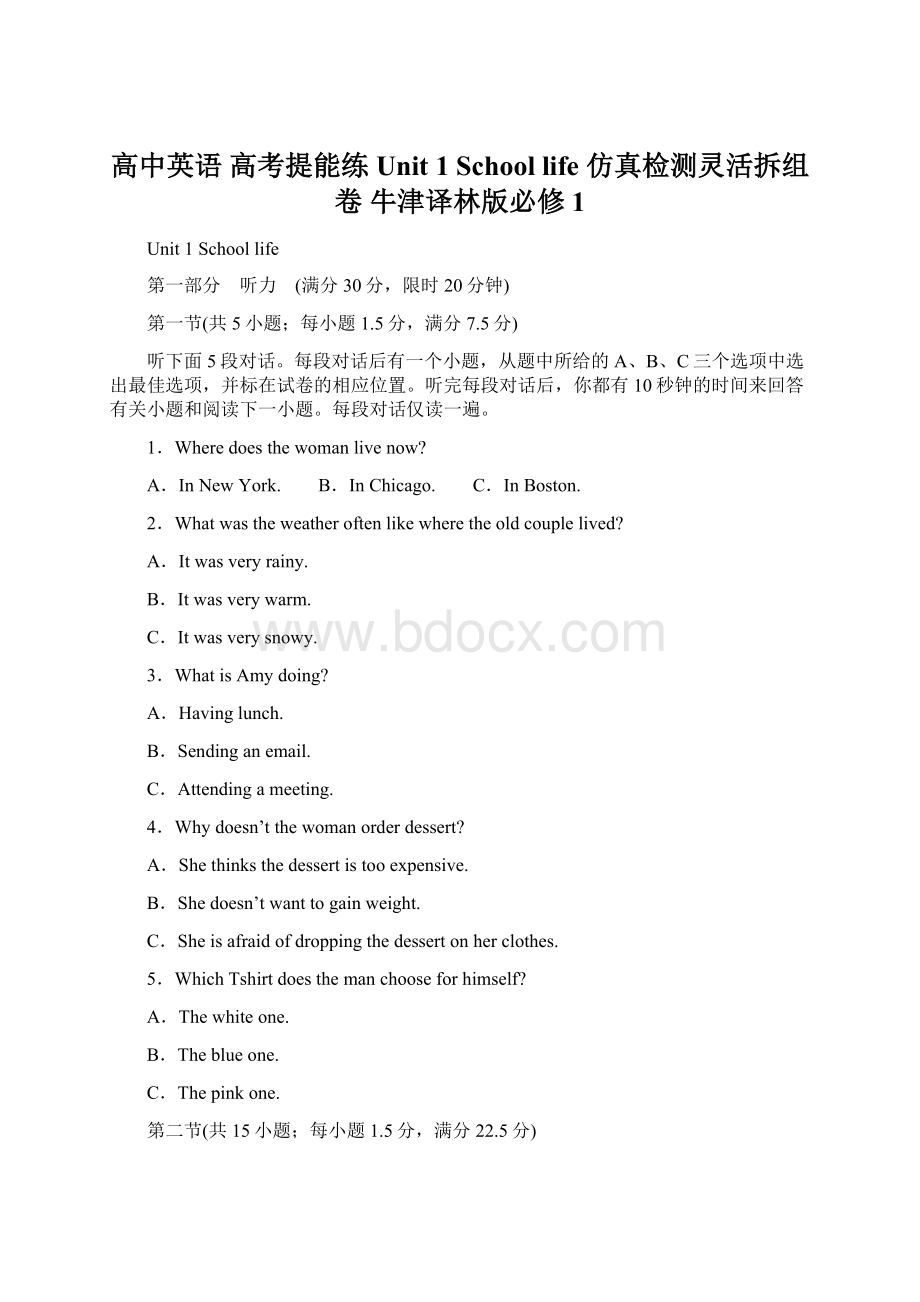高中英语 高考提能练 Unit 1 School life 仿真检测灵活拆组卷 牛津译林版必修1.docx
《高中英语 高考提能练 Unit 1 School life 仿真检测灵活拆组卷 牛津译林版必修1.docx》由会员分享,可在线阅读,更多相关《高中英语 高考提能练 Unit 1 School life 仿真检测灵活拆组卷 牛津译林版必修1.docx(19页珍藏版)》请在冰豆网上搜索。

高中英语高考提能练Unit1Schoollife仿真检测灵活拆组卷牛津译林版必修1
Unit1Schoollife
第一部分 听力 (满分30分,限时20分钟)
第一节(共5小题;每小题1.5分,满分7.5分)
听下面5段对话。
每段对话后有一个小题,从题中所给的A、B、C三个选项中选出最佳选项,并标在试卷的相应位置。
听完每段对话后,你都有10秒钟的时间来回答有关小题和阅读下一小题。
每段对话仅读一遍。
1.Wheredoesthewomanlivenow?
A.InNewYork. B.InChicago. C.InBoston.
2.Whatwastheweatheroftenlikewheretheoldcouplelived?
A.Itwasveryrainy.
B.Itwasverywarm.
C.Itwasverysnowy.
3.WhatisAmydoing?
A.Havinglunch.
B.Sendinganemail.
C.Attendingameeting.
4.Whydoesn’tthewomanorderdessert?
A.Shethinksthedessertistooexpensive.
B.Shedoesn’twanttogainweight.
C.Sheisafraidofdroppingthedessertonherclothes.
5.WhichTshirtdoesthemanchooseforhimself?
A.Thewhiteone.
B.Theblueone.
C.Thepinkone.
第二节(共15小题;每小题1.5分,满分22.5分)
听下面5段对话或独白。
每段对话或独白后有几个小题,从题中所给的A、B、C三个选项中选出最佳选项,并标在试卷的相应位置。
听每段对话或独白前,你将有时间阅读各个小题,每小题5秒钟;听完后,各小题将给出5秒钟的作答时间。
每段对话或独白读两遍。
听第6段材料,回答第6至8题。
6.Whydoesthemanthinkitisbadtotakeataxiatfirst?
A.Becausethesesuitcasesarenotheavy.
B.Becausetherearejustafewsuitcases.
C.Becausethetrafficisheavynow.
7.Howfarisittogetthere?
A.Fiftyminutesonfoot.
B.Fifteenminutesonfoot.
C.Fifteenminutesbytaxi.
8.Howdotheyprobablygothereatlast?
A.Bybus. B.Onfoot. C.Bytaxi.
听第7段材料,回答第9至11题。
9.Howdopeoplereacttootherpeople’saskingforhelpwhentheyarerelaxingathome?
A.Theyagreetoofferhelpactively.
B.Theyrefusetohelpotherpeople.
C.Theyofferhelpagainsttheirownwill.
10.Whydopeopleofferhelpwhentheyarenotwillingto?
A.Theyaresokindthattheydon’twanttoseepeopleintrouble.
B.Theyareafraidthattheywilllosefriendship.
C.Theycan’thelpofferinghelptoothersoutofhabit.
11.Whatshouldpeopledowhenfacingsuchproblems?
A.Neverrefusethepeopleinneedofhelp.
B.Alwayssay“no”tothepeoplewhoneedhelp.
C.Refusesomerequestssometimes.
听第8段材料,回答第12至14题。
12.Howdoesthemanbookhisticket?
A.OntheInternet.
B.Throughafriend.
C.Onthephone.
13.Whichcityisthemanleavingfor?
A.Houston. B.Chicago. C.NewYork.
14.Whenisthemanreturning?
A.OnMay5.B.OnMay2.C.OnMay6.
听第9段材料,回答第15至17题。
15.Wheredoesthisconversationtakeplace?
A.Athome.
B.Inaninterview.
C.Ataschool.
16.Whydoesthemanwantanewjob?
A.Hehaslosthisjob.
B.Helikescomputers.
C.Hewantstoearnmoremoney.
17.Whatwillprobablyhappentothemannext?
A.Hewillberefusedbythewoman.
B.Hewillworkasacomputerprogrammer.
C.Hewillworkasacameraman.
听第10段材料,回答第18至20题。
18.WhatdoThirdWorldcountriesoftenmistakenlydecidetodo?
A.Toopenmanynewfactories.
B.Topermitrapidindustrialization.
C.Tofireworkerswithspecificskills.
19.Whatdothefactoryownersdotogetmaximizedprofits?
A.Theymakefulluseofautomationifpossible.
B.Theyhireasmanyworkersaspossible.
C.Theytrainworkersforspecificfactoryjobs.
20.Whichaspectdoesthespeakerfocuson?
A.Theadvantagesofrapidindustrialization.
B.Theproblemsofrapidindustrialization.
C.Theprogressofrapidindustrialization.
答案:
1~5 ACBBB 6~10 CBCCB
11~15 CCBAB 16~20 CABAB
听力材料
Text1
M:
DoyouenjoylifeinNewYork?
W:
No,Idon’t.I’mplanningtomovetoChicagoorBoston.ButI’veneverregrettedmyearlierdecision.
Text2
W:
Whydidtheoldcoupleselltheirhousehere?
M:
Becausetheywantedtolivesomewherewarm.Theyweretiredofthesnowallyearround.
Text3
M:
Amy,lunchisready.
W:
Waitforamoment.Iamsendinganemail.
M:
Comeon.Ihavetoattendameetinginhalfanhour.
Text4
M:
IthinkI’llorderthechocolateicecreambecauseIdidn’teatlunchearliertoday.
W:
Nodessertforme.Icanhardlygetintomyjeans.
Text5
M:
ThisTshirtislovely.Iwillbuyablueoneformyselfandawhiteoneformywife.
W:
Wealsohavepinkones.
M:
Thengivemeapinkonetoo.
W:
OK.Thepriceis$10foreach.
Text6
W:
Fifteenminutestogetthere!
Andthesesuitcasestoo!
Ithinkweoughttotakeataxi.
M:
Notatthismoment.Lookatthetraffic.Itismovingveryslowly.Wecangettherejustasquicklyonfoot.
W:
Well,Ican’tpossiblycarrythissuitcaseanyfarther.
M:
Letmetakeit.
W:
Don’tbesilly.Youcan’tcarryyourcaseandmineaswell.
M:
Yes,Ican.Thecasesaren’tthatheavy.Hum!
W:
Yousee!
They’reheavierthanyouthought!
M:
Perhapsitisnotabadideatotakeataxiafterall.
Text7
W:
Ifindithardertosay“no”than“yes”.
M:
Metoo,andmostpeopledo.Sometimeswhenweareathomerelaxingforacoupleofdays,ourfriendsaskustooffersomehelp.Weusuallyagreereluctantly.
W:
Yes.Manypeoplesay“yes”tothiskindofrequest.Peopletendnottoconsidertheirowninterestsandfeelings,butareoftenangrywiththemselvesafterwards.
M:
That’strue.Saying“no”requirescourageandconsiderablepractice,forpeopleareafraidsaying“no”mightrisklosingthefriendshipofthepersonaskingforhelp.
W:
Butinfact,rejectingarequestcanevenhelptokeeparelationshiplastinglonger.
M:
Yes,Iagree.Itisbettertosay“no”sometimes.
Text8
W:
FrontierAirlines.HowmayIhelpyou?
M:
I’mcallingtomakeareservationforthesecondofMay.
W:
Yes,sir.Couldyougivemethecityyou’releavingfromandyourdestination,please?
M:
I’llbedepartingfromHouston,Texas,andflyingtoChicago,Illinois.
W:
Andwhendoyouwanttoreturn?
M:
Uh,Iwanttocomebackonthefifth.Oh,andma’am,I’dlikethecheapestflightyouhave.
W:
Yes,sir.Well,ifyouleaveat6amfromHoustononMaysecond,thepricefortheflightis$150.
M:
AndwhataboutfromChicagoonthefifth?
W:
That’salso$150ifyouleaveat6am.
M:
Great,let’sdothat.Andwouldyouhaveanyinformationaboutplacestostay?
I’mgoingtoanimportantmeetingintheMichiganAvenuearea.
W:
Yes,sir.Butfirst,mayIhaveyourname?
Text9
W:
So,whydoyouwanttobeacomputerprogrammer?
M:
Well,Idon’tlikeworkinginafastfoodrestaurant,andIwanttomakemoremoney.
W:
Isee.Doyouhaveanyexperience?
M:
No,butI’mafastlearner.
W:
Whatkindofcomputerdoyouuse?
M:
Computer?
Um,letmesee.IcanuseaMac.IalsousedWindows2000once.
W:
That’sgood.
M:
MayIaskaquestion?
W:
Uhhuh,goahead.
M:
WillIbeabletofindajobasacomputerprogrammer?
W:
Um,er...
Text10
ThirdWorldcountriesoftenmistakenlydecidetopermitrapidindustrialization.Whenthisindustrializationoccurs,manynewfactoriesopen,andworkersgetjobs.Unfortunately,manyofthesenewjobsarenotpermanent.Theleadersofanindustrywanttheirfactoriestobeasproductiveaspossible,andtheywilldoanythingtoachievethatgoal.Whenevertheycan,theytakeadvantageofautomation,whichmeansthatworkersarereplacedbyamoreefficientmachine.Asaresult,aworkertrainedforaspecificfactoryjobbecomesunemployed,andtheprofitsofthefactoryownersaremaximized.
ManyexpertsinThirdWorldeconomicsareconcernedaboutrapidindustrializationbecauseitbringsproblemsaswellasprogress.TheleadersofThirdWorldcountriesshouldbeawareofthedangersaswellastheadvantagesofrapidindustrialization.
第二部分 阅读理解 (满分40分,限时35分钟)
第一节(共15小题;每小题2分,满分30分)
阅读下列短文,从每题所给的四个选项(A、B、C和D)中,选出最佳选项。
A
Thelastschoolbellringsandyourkidsareoffforthesummer.Formostkidsthosethoughtsofschoolworkandlessonsareadistantmemorythattheywon’tbethinkingaboutagainuntilfall.Soit’simportantforthemtocontinuesomelearning.
HaveYourKidsHittheLibrary
Encourageyourkidstoreadbytakingthemtothelibraryduringthesummer.Iftheydon’thavealibrarycard,getthemone.Manylocallibrariessponsor(主办)summerreadingclubsthatkeepyourkidswantingtoread.Besuretoletyourkidspicktheirownbooksout;summerisforfunreading.
HaveYourKidsReadEveryDay
Askyourkidstoreadoutsideinthesun.Joininwiththem,readaloudtheirfavouritebooks,nomatterhowmanytimesyouhavereadthem.Pickatimeeverydaywhenyouallstopandreadasafamilytogether.Nothingwillstimulateachildtoreadthantohaveadultsreadingwiththem.
FindOtherWaystoEncouragetheKids
Ifyouareplanningafamilytrip,havethemcheckoutthemap.Letyourkidsgoonlineandresearchwhereyouaregoing.Haveyourkidschecktheweatherreportinthenewspaperorwhatbigeventishappeningandthenhavethemreportbackonitatdinnertime.Haveyourkidscheckoutmagazinesorwebsitesforrecipes(食谱)thatcanbeprepared.
__________________
Learningtoexpressyourthoughts.Thewritinginalogical(合逻辑的)mannerisaskillthatisoftenlost.Tohelpyourkids,havethemwriteaboutthingsduringthesummer.Ifyourkidslovesomethingsuchasanimals,havethemwriteshortreportaboutthemtosharewiththefamily.Ifyouaregoingonatrip,haveyourkidskeepatraveljournal.
语篇解读:
本文主要告诉父母如何利用暑假让孩子学习。
21.Inthewriter’sopinion,wheninalibrary,parentsshould________.
A.keepacloseeyeonwhattheirkidsread
B.helptheirkidsfindusefulbooks
C.onlylettheirkidsreadbooksonsubjects
D.lettheirkidschoosewhattheylikereading
解析:
选D 细节理解题。
根据第二段的“Besuretoletyourkidspicktheirownbooksout;summerisforfunreading.”可知应选D项。
22.Whatdoestheunderlinedword“stimulate”inParagraph3mean?
A.require B.teach
C.encourageD.stop
解析:
选C 词义猜测题。
这里是指没有什么比让成年人跟他们一起阅读更能“激励”他们阅读的了,故选C项。
23.InParagraph4,thewritersuggeststhatparents________.
A.helptheirkidslearnthroughdailyactivities
B.encouragetheirchildrentousetheInternet
C.careaboutwhatishappeningaroundtheworld
D.teachtheirkidstocookatayoungage
解析:
选A 细节理解题。
通读第四段可知,作者建议父母利用日常生活中的一些小事来帮助孩子们学习,故选A项。
24.What’sthebesttitleforthelastparagraph?
A.AskThemtoKeepDi